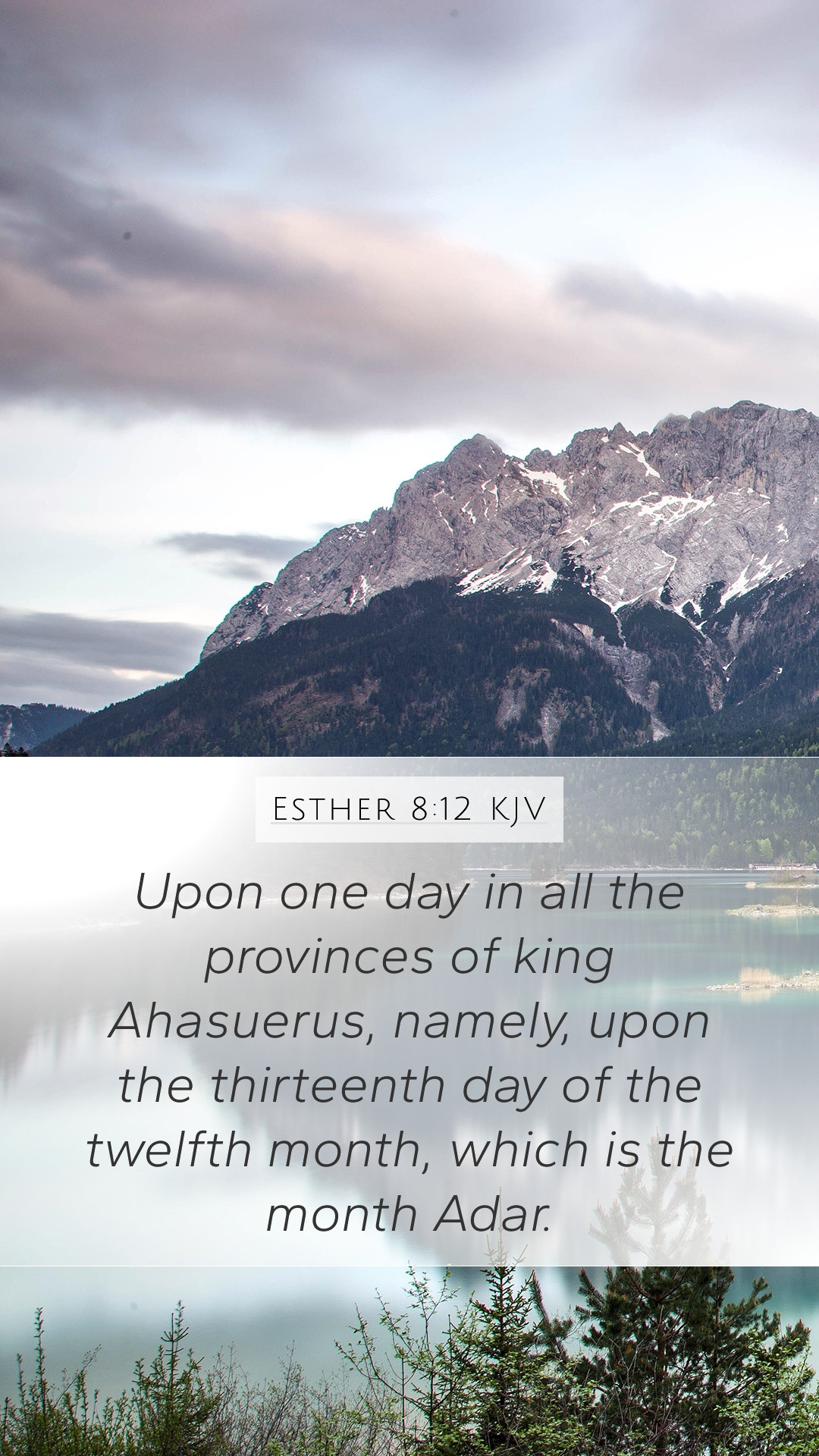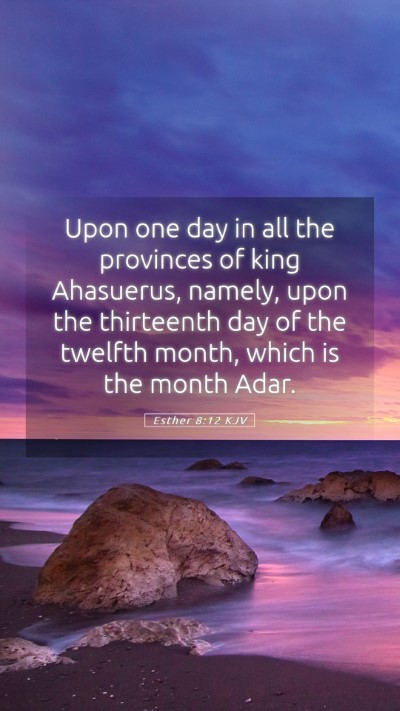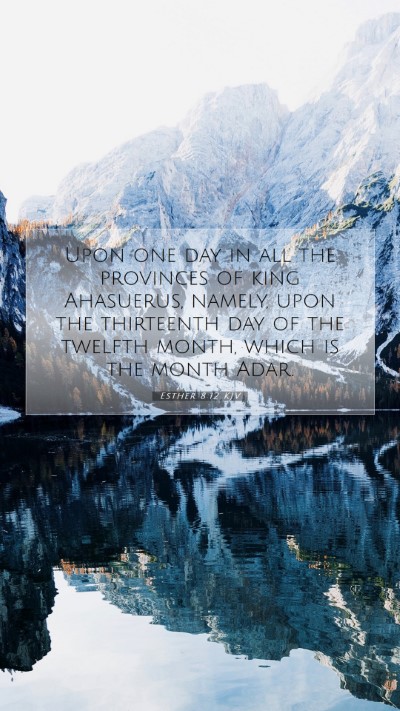Old Testament
Genesis Exodus Leviticus Numbers Deuteronomy Joshua Judges Ruth 1 Samuel 2 Samuel 1 Kings 2 Kings 1 Chronicles 2 Chronicles Ezra Nehemiah Esther Job Psalms Proverbs Ecclesiastes Song of Solomon Isaiah Jeremiah Lamentations Ezekiel Daniel Hosea Joel Amos Obadiah Jonah Micah Nahum Habakkuk Zephaniah Haggai Zechariah MalachiEsther 8:12 Meaning
What is the meaning of Esther 8:12?
Upon one day in all the provinces of king Ahasuerus, namely, upon the thirteenth day of the twelfth month, which is the month Adar.
Esther 8:12 Bible Verse Meaning
Understanding Esther 8:12: A Comprehensive Bible Verse Analysis
Esther 8:12 states, "Upon one day in all the provinces of King Ahasuerus, namely, upon the thirteenth day of the twelfth month, which is the month Adar." This verse marks a significant point in the narrative of Esther, illustrating the culmination of events that led to the rescue of the Jewish people. Below, we explore the verse's meaning with insights from renowned biblical commentators.
Summary of Bible Verse Meanings
The interpretation of Esther 8:12 highlights several key themes:
-
Timing of God’s Salvation:
Matthew Henry emphasizes that God's deliverance often comes at a designated time, as seen here with the set date for the Jews' salvation and the downfall of their enemies.
-
Jewish Penance and Rejoicing:
Albert Barnes focuses on the importance of the date in the Jewish calendar, bridging themes of penance and the joy of divine intervention, reinforcing the importance of God's covenant with His people.
-
The Significance of Adar:
Adam Clarke interprets the context of the month Adar, pointing to its historical significance and the symbolic transition from grave danger to jubilant deliverance for the Jewish people.
Detailed Commentary on Esther 8:12
This verse is pivotal as it represents a turning point in the Book of Esther, showcasing how seemingly dire circumstances can be transformed through divine guidance. Understanding this verse involves:
-
The Role of Providence:
The commentators converge on the theme of providence, highlighting that God orchestrates events for the fulfillment of His promises—a foundational principle for the study of Scripture.
-
Covenant Relationship:
Esther’s narrative illustrates the enduring covenant between God and Israel, where His protection and deliverance remain steadfast, and this verse exemplifies the historical fulfillment of that promise.
-
Historical Context:
Understanding the historical context of Esther allows readers to appreciate the deeper implications of this passage, as well as its relevance to Jewish traditions, such as Purim—the festival celebrating this very salvation.
Application of Esther 8:12 in Contemporary Life
For modern believers, Esther 8:12 serves as a reminder that:
-
God is in Control:
Even when circumstances seem overwhelming, faith in God's timing is essential. His faithful intervention can bring about unexpected salvation.
-
Celebrating Deliverance:
The significance of remembering God’s actions should encourage believers to celebrate divine intervention in their lives, similar to the celebration of Purim.
-
Hope amidst Adversity:
This narrative provides a strong foundation for relying on God in challenging times, affirming that He is a refuge and strength.
Bible Study Insights
In conducting an in-depth Bible study, readers are encouraged to explore the following themes associated with Esther 8:12:
-
How to interpret Bible verses:
Utilizing historical and cultural contexts to clarify scripture meanings.
-
Understanding difficult Bible passages:
Engaging with commentaries helps decipher complex narratives in scripture.
-
Meaning of parables in the Bible:
Exploring the illustrative narratives that accompany the history, leading to a fuller understanding of biblical teachings.
Cross References Related to Esther 8:12
This verse connects to several other key biblical passages:
- Esther 3:13: The decree against the Jews highlights the peril they faced.
- Esther 9:1-2: The execution of the decree and the deliverance of the Jews.
- Jeremiah 29:10: A reminder of God's promised restoration for His people.
Conclusion
In conclusion, Esther 8:12 serves as a vital verse reflecting God's providence and the assurance of His deliverance. By combining insights from various Bible commentaries, we gain a rich understanding of this Scripture, allowing us to see its relevance both historically and contextually in our lives today. This verse encourages believers to remember God's faithfulness and to celebrate His interventions amid life's adversities.


